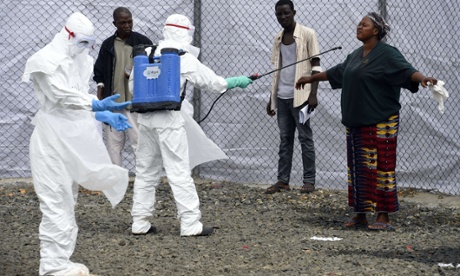Series: Guardian Africa network
From a village in Guinea to a hospital in Madrid: key moments in the spread of the world’s largest outbreak of Ebola

28 December 2013
A two-year-old child, identified only as Emile, dies of an unidentified haemorraghic fever in the town of Guéckédou in Guinea, followed by his mother, sister and grandmother. Mourners at the grandmother’s funeral, together with a healthcare worker, carry the virus to nearby villages.
22 March 2014
Guinea reports that the fever has been confirmed as Ebola, and has already killed 59 people. There are already concerns that it may have spread to neighbouring Sierra Leone.
28 March 2014
Two Ebola cases are reported in Liberia among people who have been to Guinea.
26 May 2014
Ebola has reached Sierra Leone, the World Health Organization (WHO) confirms. Four months later, an increasingly desperate government will bar people from leaving their homes for three days in a bid to halt the spread of the virus.
20 July 2014
Liberian government employee Patrick Sawyer arrives in the 21-million-strong city of Lagos in Nigeria and collapses, having flown from Liberia with a lay-over in Togo. He dies of Ebola five days later, sparking concerns about the ease with which the virus might jump borders.
27 July 2014
Liberia shuts down most of its border crossings. Dr Sheik Umar Khan, who played a pioneering role in Sierra Leone’s response to the virus, dies two days later after becoming infected.
8 August 2014
The WHO declares Ebola an “international health emergency”. Four days later, the death toll exceeds 1,000.
12 August 2014
After some debate, the WHO gives its cautious blessing to the use of experimental drugs to treat Ebola. The fact that there were no approved drugs available points to the lack of financial incentive to develop such interventions previously.
22 August 2014
A doctor in Nigeria’s oil hub Port Harcourt dies of Ebola, the second death on Nigerian soil. Fears rise for how quickly the virus may spread in Africa’s most populous country, but Nigeria goes on to demonstrate apparent success in containing it.
24 August 2014
British volunteer nurse William Pooley is flown back to the UK for emergency treatment after contracting Ebola while helping treat patients in Sierra Leone. Pooley,29, goes on to make a full recovery.
26 August 2014
The health ministry of the Democratic Republic of Congo informs the WHO of an outbreak of Ebola which is later confirmed to be a different strain to that affecting west Africa.
27 August 2014
Médecins Sans Frontières calls the international response to Ebola “irresponsible” and “slow and derisory”, saying health services in the affected countries needed to be bolstered with operational support rather than politicians’ empty promises
29 August 2014
Senegal becomes the fifth country to be hit by Ebola, while riots break out in neighbouring Guinea over rumours that health workers are deliberately transmitting the virus to locals.
5 September 2014
With the pace of the epidemic accelerating, WHO figures suggest that 2,100 people have died from a total of around 4,000 who are thought to have been infected.
16 September 2014
Barack Obama announces that the US will send 3,000 troops to west Africa to build Ebola treatment centres and establish a military coordination centre. The epidemic, Obama says, is “spiralling out of control”.
26 September 2014
WHO puts the death toll at 3,091 of 6,574 suspected cases. Liberia, Guinea and Sierra Leone remain the hardest-hit countries, with Nigeria and Senegal faring better.
29 September 2014
Thomas Duncan, who flew from Monrovia to Dallas via Brussels and Washington, becomes the first person to be diagnosed with Ebola while on US soil, and dies just over a week later. Two healthcare workers who treated Duncan go on to test positive for Ebola, with nurse Nina Pham becoming the first person to contract Ebola while within the US.
7 October 2014
A Spanish nurse becomes the first person to contract the virus outside west Africa. Madrid-based Teresa Romero Ramos had been treating a Spanish priest who was flown home after contracting Ebola in Sierra Leone. The diagnosis raises concerns over Europe’s state of readiness to deal with the virus.
9 October 2014
The UK announces that it will introduce temperature screening for passengers arriving at Gatwick and Heathrow airports from west Africa. In the US, New York’s JFK airport starts enhanced Ebola screenings on 11 October.
14 October 2014
WHO announces that the fatality rate from Ebola has reached 70%, with the total number of deaths so far topping 4,447.
